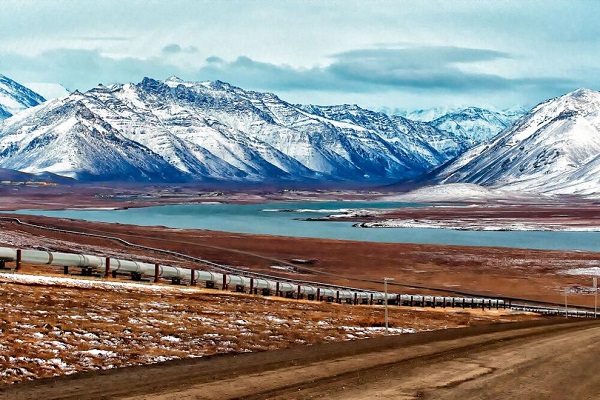Energy
Ukraine war proves value of LNG Canada, CEO tells global gas conference in Vancouver

Delegates are silhouetted before the start of the LNG 2023 conference, in Vancouver, B.C., Monday, July 10, 2023. THE CANADIAN PRESS/Darryl Dyck
Vancouver
Volatility in the supply and price of natural gas worldwide since Russia’s invasion of Ukraine shows the value of the LNG Canada project as a source of “affordable, reliable” and “responsibly produced” liquefied natural gas, the project’s CEO said.
“I can’t think of any country better placed to supply Asia with exactly that than Canada,” said Jason Klein of LNG Canada, the massive export facility currently under construction in Kitimat, B.C.
Klein said the $40-billion project is close to 85-per-cent complete and will aim to compete globally, not only on price but also its environmental and social track record.
Klein made the comments at the opening of the LNG 2023 conference in Vancouver, an event that was originally scheduled for last year in the Russian city of St. Petersburg before being moved to B.C. because of the war in Ukraine.
That situation, Klein said, may be the best example of the value of Canadian energy and its stability on the world stage.
“I think it’s an amazing opportunity to reflect on the fact that the very act that causes us to be in Vancouver today is the same one that’s upending global energy markets,” Klein said.
The LNG 2023 conference runs until Thursday, drawing multinational energy corporations such as energy giants Petronas, BP and ConocoPhillips, as well as government representatives from key producing countries such as Qatar. The conference is held every three years.
Organizers said the discussion at the conference would be centred around economic consequences of market upheaval. The disappearance of Russia, the world’s largest natural gas exporter, from Western supply chains was at the forefront of several conference panels.
Experts said that while Europe took the brunt of losing Russian gas supplies, Asia also suffered, because European buyers pushed up the prices for liquefied natural gas globally, and many countries struggled to secure supply.
Sarah Bairstow, president and chief commercial officer for U.S. LNG producer Mexico Pacific, said that was why the industry should keep its attention on Asia — which she described as the “demand engine” for the commodity.
“What we’ve seen as a result of the last 12-15 months is Asia-Pacific buyers … they know they need baseline gas supply not only for their own generation, but also for their own energy transition goals,” Bairstow told the conference. “And they are really seeking to get ahead of the curve of Europe.”
Canadian organizers of the conference said that, in addition to stability, First Nations economic reconciliation is a major part of what the sector wants to present to the global natural gas industry.
First Nations LNG Alliance chair Crystal Smith told the conference that more extensive Indigenous community involvement is on the way in projects such as the planned Cedar LNG facility in Kitimat.
“I think about where our community was even 10 years ago in regards to our participation in our economies,” Smith said of Haisla Nation’s ownership of the project.
“We essentially sat on the sidelines and watched everybody in our territory and surrounding area proper … to now, I can’t help but smile and get absolutely emotional at being majority owners of Cedar LNG.”
This report by The Canadian Press was first published July 10, 2023.
Energy
Net Zero’s days are numbered? Why Europeans are souring on the climate agenda

From LifeSiteNews
By Frank Wright
Dr. Benny Peiser recently spoke about how the E.U. and various European nations have started a ‘rollback’ of their climate agendas due to ‘increasing costs and increasing hostility from the public.’
A recent presentation given in Canada brings welcome news to the reality-based community: Net Zero’s days are numbered. The costs of the “utopian” green agenda have been realized, and the public are not buying it any more.
This is the message of Dr. Benny Peiser of the Global Warming Policy Foundation, who was in Calgary on April 9 to speak about “Europe’s Net Zero rebellion and the implications for Canada.”
“The game is over for anyone who is willing to commit industrial suicide through the implementation of Net Zero policies,” he says, going on to cite public opinion and political decisions which are driving the political agenda of the future.
Peiser shows how the European Union and the nations of Sweden, France, Germany, Britain, and Italy have started this “rollback” – due to “increasing costs and increasing hostility from the public.”
Saying that Canada, where he spoke, is “maybe five years” behind the Net Zero rollback in Europe, he said the agenda was in retreat there as its “astronomical” costs have now been grasped by the public.
“This is direct,” he says.
We have been telling [the public] for 15 years this will be very expensive … and your energy bills are going up because of the renewables.
This is all far too abstract for people. They don’t get that.
Citing reports which show that Net Zero will cost over a trillion euros a year, every year, he says:
This they get directly – the car they can’t drive, the way they heat their homes. What they’re allowed to do.
That has caused huge opposition and a lot of headache for governments.
Peiser says political parties across Europe have realized that they face being swept from power in the forthcoming elections in June.
Politics pivots back to reality
The headaches Peiser cites include the near collapse of the German government late last year over a policy to make heat pumps compulsory. A week after Peiser’s talk, news came that the Scottish coalition government has collapsed, with the Greens withdrawing support from the ruling SNP after the abandonment of climate change targets.
Politicians are faced with a choice between electoral oblivion and public opinion, and Peiser says this has led to structural change in European policy.
Peiser believes that the enormous public support behind the farmer protests, coupled with green policies creating crisis in the German government, has made the E.U. think again.
“As a result of these protests governments and the European Commission itself have begun to cave in,” Peiser said. “They are not just losing farmers but a large chunk of the public at the same time.”
Peiser is aware that election cycles see politicians shelve unpopular policies – only to resume them after the votes have been counted. Yet he notes a structural change in priorities.
“The E.U. in its draft agenda for the next five years has decided to relegate climate and shift to defense,” he continued, saying that the European Union is shifting from the green agenda to the “real agenda.”
This pivot to reality is one that is long overdue. As Peiser points out, the case for Net Zero is one that is made out of words, not of facts. To take one example, that of electric vehicles, he says “the biggest fear in Europe is not climate change. The biggest fear is cheap electric vehicles from China.”
The E.U.’s recent Net Zero Industry Act (NZIA) has been shaded by economic and industrial concerns, as well as fear from the climate lobby that it too is a rollback of Net Zero commitments.
Passed on April 25, its name alone would suggest business as usual for the climate agenda.
However, in a press conference introducing the Act last November, German “conservative” MEP Christian Ehler was keen to anticipate criticism from the Green lobby, saying “this is not an attempt to scrap social achievements or environmental law.”
Ehler’s emphasis here was on industry and whether Europe will have an economic and industrial future – or not.
Ehler stressed the need to keep industry “on our side” and that the past practices of regulation threatens the economic future of European industry,
It’s simply reflecting the very fact that our industry is burdened by regulation in a way that we can’t expect them to succeed – if we really want to have them on our side – and if we really have to have an economic future for the European industry.
READ: New documentary exposes climate agenda as ‘scam’ to increase globalist power and profit
An act in name only
This may explain why, according to two experts, the Act is in fact just words. Yet it is not only the threat of Green-inspired regulation which faces European industry.
Chinese dominance of the market has rendered E.U. Net Zero measures to create a “sustainable” industry producing “green technology” such as solar panels mere “paper tigers,” according to one analyst.
Simone Tagliapietra, a senior fellow at think-tank Bruegel said this in response to the E.U.’s new Act.
His comments, reported by Euractiv on April 26, included an explanation why the legislation “doesn’t change anything.”
A second analyst, Nils Redeker of the Berlin-based Jacques Delors Centre, agreed according to Euractiv that the new measures “could, in practice, and will most likely, be ignored.”
The green lights are going out all over Europe, most obviously in what was once its industrial and economic powerhouse.
Germany in crisis
Following a budget crisis which also threatened the survival of the German government’s “Red/Green/Yellow” or “traffic light” coalition last November, the former E.U. paymaster of Germany was said to be “likely in recession.”
The February 19 report by the Daily Telegraph noted the resulting “uncertainty” over Net Zero implementation. This is another sign of the impact of reality on the deeply unpopular policies of what Peiser called the “utopia” imagined by the Green lobby.
The Daily Telegraph also reported that the German central bank had warned of “no end in sight” for the “ongoing weakness” of Europe’s largest economy.
The Bundesbank added that “uncertainty regarding climate and transformation policy remains elevated.”
In his analysis of the electoral cost of Net Zero, Peiser seems to have read the room very well. The political climate has changed.
As the British government is faced with power cuts over soaring demand for electricity, its refusal to build more gas-fired power stations may see the actual lights go out as well as the figurative beacon of an agenda the Conservative Party have greenlit for years.
U.K. climate chief quits
The outgoing head of the U.K.’s climate change committee has conceded that Net Zero is a toxic brand:
Net Zero has definitely become a slogan that I feel occasionally is now unhelpful, because it’s so associated with the campaigns against it.
Chris Stark, who looks exactly as you would imagine he would, blamed a minority faction of imaginary “culture warriors” whilst saying on April 22 in The Guardian that the cost of living was effectively irrelevant.
“It’s the culture warriors who have really taken against it,” said Stark. “A small group of politicians or political voices has moved in to say that net zero is something that you can’t afford, net zero is something that you should be afraid of … But we’ve still got to reduce emissions. In the end, that’s all that matters.”
Stark’s missionary zeal is untouched by a Europe-wide survey cited by in Peiser’s presentation. According to the survey, conducted in January by the European Council on Foreign Relations (ECFR), it is the climate zealots themselves who are the minority.
With a sample from 12 European nations, it shows a clear majority in 10 countries for “reducing energy bills” over “reducing carbon emissions.” In Germany, support for lower energy costs is more than twice that for the higher ones promised by “reducing emissions.”
Peiser explained, “What [the survey] tells you is that a clear minority of Europeans are prioritizing the climate issue over their energy cost issue.”
READ: Climate expert warns against extreme ‘weather porn’ from alarmists pushing ‘draconian’ policies
Describing the clear majority of European citizens against the cost of Net Zero, he says “that is the most dramatic change I’ve seen in the last 20 years.”
This “realization of cost moment” is one which Peiser shows had been predicted in the 1970s by Anthony Downs, whose “issue attention cycle” predicted public understanding of the true cost as the point beyond which climate policies will no longer enjoy public support.
The graph roughly charts the interest and support of the public, which moves from ignorance of the “problem” to generate public support through a sense of alarm. This enthusiasm steeply fades as the public realizes the price of the product they have been sold.
Yet this process is based on the common sense to the common man. The U.K.’s former climate change chief Christopher Stark is immune to this determining factor.
He displays the alarming detachment from reality which typifies the Net Zero zealot, and which Peiser warns is proving electorally – and industrially – suicidal.
Speaking of the implementation of Net Zero, Stark claimed, against rapid deindustrialization, soaring energy prices, and former measures to restrict cars and home heating to costly and inferior alternatives, that “the lifestyle change that goes with this is not enormous at all.”
This also ignores the likely “power cuts” that Britain will face, given a massive upsurge in Net Zero-driven electricity demand.
The Daily Telegraph, reporting accusations from the Green lobby that Rishi Sunak was “abandoning” Net Zero, said on March 17 that without more gas fired power generation, support for Net Zero “would collapse.”
The report continued that “the U.K. would almost certainly endure power cuts, causing civic and commercial havoc, without more gas-fired baseload in place.”
The piece concludes with a verdict which is now becoming a theme: “And then the case for tackling climate change, already increasingly questioned, would become politically toxic.”
The rule of law – or the rule of lawyers
As Peiser notes, this toxification has weakened the power of politics itself, with the rule of law being replaced by the rule of lawyers. He notes a recent ruling by the European Court of Human Rights, which condemned the Swiss government for “violations of the Convention [on Human Rights] for failing to implement sufficient measures to combat climate change.”
Peiser said the ruling showed that democratic majorities do not have the legal power to refuse an agenda enforced by activist judges. He went on:
The judges in their in their ruling said it’s kind of naive to think that democracy would work just with majorities in Parliament and that only judges can rule or decide what makes legal sense – that’s why it’s so important for judges to tell parliaments what they should do.
That’s essentially what they were saying today.
Peiser was speaking on the same day the ruling was announced, which according to a Swiss report will “have a direct impact on the Council of Europe’s 46 member states” and that “its ramifications will extend to the whole world.”
This element of legal insurrection is one direct example of how the sovereignty of democracy is being undermined. In this case, a group of elderly female climate campaigners received a sympathetic hearing from the ECHR’s presiding judge, Siofra O’Leary. Her judgment overruled the Swiss courts’ dismissal of the case. It read:
The Court found that the national courts had not provided convincing reasons as to why they had considered it unnecessary to examine the merits of the complaints. They had failed to take into consideration the compelling scientific evidence concerning climate change and had not taken the association’s complaints seriously.
As Peiser warns, we are ruled by Science Followers, whose emotional enthusiasm for the climate panic talks past the costs of the sale of this agenda. It is a product which most people now recognize promises the permanent collapse of living standards in the West, and is taking democracy down with cries for climate “justice.”
Suicidal policy vs. ‘populism’
Peiser says Net Zero is already “suicidal” – and not in name only. Changing the branding will not wash with voters, Peiser says, as the impact of cost and on freedom is “direct.”
This, he says, is what is driving the beginning of the end of Net Zero.
“Europeans have been told that this Net Zero issue and renewables and so on will make life easier for people.” Instead, he says, “the opposite has happened.”
They’ve been told that energy costs would go down. They’ve gone up.
He observes a factor which could apply to practically any of the policies he also claims are driving “populism.”
So people are beginning to realize that what they’ve been told hasn’t actually materialized.
The opposite has materialized.
Peiser himself notes that this “opposite effect” is driving the rise of “populist parties … skeptical of mass immigration, of Net Zero and of other mainstream policies.”
He says, “I don’t know exactly why they’re called populist but something makes them popular.”
Yet his own presentation shows a simple explanation. What is called “populism” is simply a reaction to the insanity of the policies of national suicide presented as wisdom. The emergence of these parties is the opposite reaction to a political system whose every argument is a contradiction of reality.
Peiser says that this political correction is coming, and soon.
The mainstream parties are concerned that they will hemorrhaging voters.
That’s what the prospects are for the elections in June.
His assessment is shared by the European Council on Foreign Relations, which predicted a “sharp right turn” in the forthcoming E.U. Parliament elections.
He says that for Europe “there might be – for the first time – a center right populist majority in Parliament. If that were to happen of course all bets are off.”
What is more, Peiser concludes that political climate change is coming home – to yours:
That’s the situation in Europe which sooner or later will come to a theater close to you.
Energy
Houses passes bill to protect domestic oil production, protect Iñupiat community

From T
Indigenous communities are advocating for economic development projects in the North Slope, explaining that more than 95% of their tax base comes from resource development infrastructure.
The U.S. House passed another a bill to advance domestic energy production, this time in response to cries for help from an indigenous community living in the Alaska North Slope.
The bill’s cosponsor, a Democrat from Alaska, did not vote for her own bill. It passed with the support of five Democrats, including two from Texas who are strong supporters of the U.S. oil and natural gas industry.
The U.S. House has advanced several bills and resolutions to support domestic U.S. oil and natural gas production, supported by Texas Democrats. They’ve done so after the Biden administration has taken more than 200 actions against the industry, The Center Square reported.
One includes the Department of the Interior restricting development on over 50% of the Arctic National Wildlife Refuge (ANWR), directly impacting the Iñupiat North Slope community.
The Alaska North Slope region includes a part of ANWR and National Petroleum Reserve-Alaska (NPRA). Both are home to the indigenous Iñupiat community who maintain that the Biden administration is trying to “silence indigenous voices in the Arctic.”
The plan to halt North Slope production was done through a federal agency rule change, a tactic the administration has used to change federal law bypassing Congress. The rule cancels seven oil and gas leases issued by the Trump administration in the name of “climate change.” Interior Secretary Deb Haaland said canceling the leases was “based on the best available science and in recognition of the Indigenous Knowledge of the original stewards of this area, to safeguard our public lands for future generations.”
The indigenous community strongly disagrees, saying they weren’t consulted before, during or after the rule change.
Nagruk Harcharek, president of the Voice of Arctic Iñupiat, a nonprofit that represents a collective elected Iñupiaq leadership, says the administration’s mandate “to ‘protect’ 13 million acres of our ancestral homelands was made without fulfilling legal consultative obligations to our regional tribal governments, without engaging our communities about the decision’s impact, and with an incomplete economic analysis that undercuts North Slope communities.”
He argues the administration has overlooked “the legitimate concerns of elected Indigenous leaders from Alaska’s North Slope. This is a continuation of the onslaught of being blindsided by the federal government about unilateral decisions affecting our homelands.”
Restricting NPR-A oil production is “yet another blow to our right to self-determination in our ancestral homelands, which we have stewarded for over 10,000 years. Not a single organization or elected leader on the North Slope, which fully encompasses the NPR-A, supports this proposed rule,” he said, adding that they asked for it to be rescinded.
In response, U.S. Reps. Mary Sattler Peltola, D-Alaska, and Pete Stauber, R-Minn., introduced HR 6285, “Alaska’s Right to Produce Act.” The U.S. House Committee on Natural Resources Subcommittee on Energy and Natural Resources held a hearing on the issue; members of the Iñupiat Community of the Arctic Slope and the Kaktovik Iñupiat Corporation testified.
Kaktovik Iñupiat Corporation president Charles Lampe said they “refuse to become conservation refugees on our own homelands and unapologetically stand behind the Alaska’s Right to Produce Act.”
The Kaktovik is the only community located in the ANWR. The North Slope Iñupiat have stewarded their ancestral homelands for thousands of years, predating the creation of the U.S. federal government, the Interior Department and the state of Alaska, they argue.
The indigenous communities are advocating for economic development projects in the North Slope, explaining that more than 95% of their tax base comes from resource development infrastructure. Tax revenue funds public school education, health clinics, water and sewage systems, wildlife management and research and other services that otherwise would not exist, they argue. Eliminating their tax base, will directly impact their lives and jeopardize their long-term economic security, they argue.
The House passed Alaska’s Right to Produce Act on Wednesday to reverse the rule change and establish the Coastal Plain oil and gas leasing program. It authorizes and directs federal agencies to administer oil and natural gas leasing on 13 million acres of public land in the North Slope.
The bill passed by a vote of 214-199 without the support of its Democratic cosponsor from Alaska, Peltola, who voted “present.”
Five Democrats voted for it: Sanford D. Bishop, Jr. of Georgia, Henry Cuellar and Vincente Gonzalez of Texas, Jared Golden of Maine and Marie Gluesenkamp Perez of Washington. One Republican voted against it, Rep. Brian Fitzpatrick of Pennsylvania.
After it passed, Harcharek said, “Since the Biden administration announced this decision in September, our voices, which overwhelmingly reject the federal government’s decisions, have been consistently drowned out and ignored. This administration has not followed its well-documented promises to work with Indigenous people when crafting policies affecting their lands and people. We are grateful to Congress for exercising its legislative authority to correct the federal government’s hypocrisy and advance Iñupiaq self-determination in our ancestral homelands.”
Kaktovik Mayor Nathan Gordon, Jr. said the administration “is regulating our homelands in a region they do not understand and without listening to the people who live here.” The new law is “a vital corrective measure that will prevent our community from being isolated and protect our Iñupiaq culture in the long term.”
The bill heads to the Democratic controlled Senate, where it is unlikely to pass.
-

 Environment2 days ago
Environment2 days agoJournalism Misrepresent Climate Science
-

 Addictions2 days ago
Addictions2 days agoBritish Columbia to re-criminalize hard drug use in public after massive policy failure
-

 Addictions22 hours ago
Addictions22 hours agoCity of Toronto asks Trudeau gov’t to decriminalize hard drugs despite policy’s failure in BC
-

 Business1 day ago
Business1 day agoWhen politicians gamble, taxpayers lose
-

 illegal immigration2 days ago
illegal immigration2 days agoOklahoma Just Became The Latest State To Take Immigration Enforcement Into Its Own Hands
-

 Automotive22 hours ago
Automotive22 hours agoVehicle monitoring software could soon use ‘kill switch’ under the guise of ‘safety’
-

 Economy2 days ago
Economy2 days agoYoung Canadians are putting off having a family due to rising cost of living, survey finds
-

 Alberta2 days ago
Alberta2 days agoProtecting the right to vote for Canadian citizens: Minister McIver








